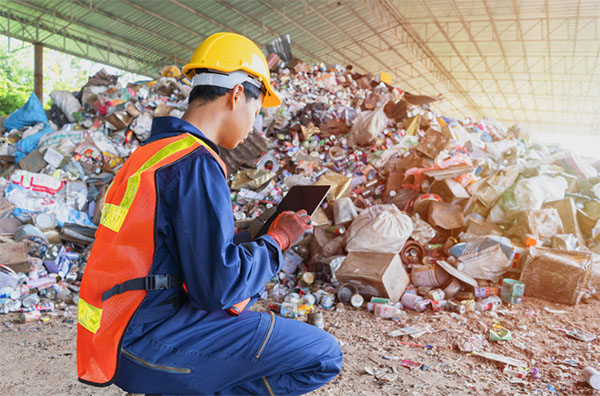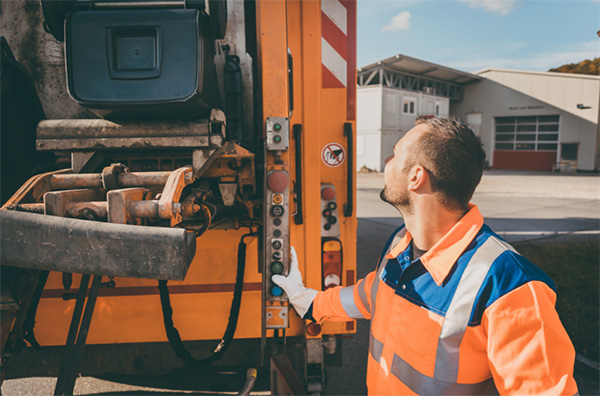It’s a hard, dirty job. And we can’t live without it. Collecting garbage, keeping our streets clean, and safely disposing of our waste are essential services that the entire world depends on. Waste management professionals, including sanitation workers and garbage collectors, are unsung heroes. They carry out one of the world’s most hazardous jobs. And it’s a job that is often taken for granted.
Waste workers are at risk of exposure to dangerous materials. Dust inhalation, broken glass, chemicals, and syringes are just a handful of the potential hazards that garbage collectors can run into while on the job. Even with the development of new equipment such as automated side-loader garbage trucks (which is making a real difference to waste worker safety), there is no denying that handling refuse is a physically demanding job. Garbage bags can be surprisingly heavy. Add on the fact that garbage collectors work outside in all kinds of weather conditions with untraditional working hours, such as early in the morning or late at night. There’s no doubt that waste collection is hard work.
So, what can you do to make the demanding tasks of garbage collection a little easier? Smart waste technology is proving to be a highly effective tool for improving working conditions in the waste sector. Although data gathered from smart waste containers can’t do much to change the hazardous nature of the job, it can help waste management professionals work more efficiently, more autonomously, and with a greater sense of purpose.
Learn more about how smart waste sensors and data insights work.
1. Work More Efficiently with Smart Sensors
Workplace efficiency is about doing more with less. It means helping employees work smarter, not harder. And that’s where smart waste management technology comes in. Smart waste management is all about using data to make the most of your available resources.
So how exactly do smart waste sensors increase the efficiency of your waste management? The key lies in the data and actionable insights provided by the sensors. By gathering real-time data on the fill levels of bins, smart waste sensors enable waste management professionals to remotely monitor how full or empty bins are. This means that garbage collectors no longer have to check and service all bins on their collection routes. Instead, they can skip half-empty bins and focus their efforts solely on containers in need of service.
The data from the sensors provides invaluable insights that can help garbage collectors complete their work faster and more efficiently. This may even free up time for other tasks, such as seasonal maintenance, that are often neglected due to time pressure.
This was certainly the case at the University of Idaho. Here, the smart sensor data helped the facility management team transition to more effective ways of working. Instead of driving by every single bin on campus, the team now kickstart their day in front of the computer. They check their smart waste management platform and observe the fill level statues of bins online. This empowers them to tailor their collection routes, so they can skip empty bins that did not require picking up. Thanks to a smarter way of working, the team have been able to halve their working hours.

2. Feel a Greater Sense of Purpose at Work
People are more satisfied at work when their jobs feel meaningful. As humans we have an intrinsic need to connect to something bigger than ourselves. We generally want to work in a way that makes a difference and contributes to the greater good. But when we experience our work tasks as pointless or unnecessary, we tend to find our jobs less meaningful and less satisfying.
Waste collection is vital to the functioning of our society. But when the job is carried out in a traditional way, garbage collectors’ sense of purpose may fade. Waste tasks carried out in a static manner – where all bins are serviced regardless of fill level – can feel monotonous or devoid of meaning. Afterall, what is the point of servicing an empty bin?
A 2019 study of a Danish municipality shows that 40% of bins were serviced when they were less than a quarter full. And research in Israeli municipalities shows that half of all waste collections are spent picking up bins that are far from full. Powering bins with smart waste sensors can transform this situation and eliminate empty collections. At the same time, the technology can help instill a greater sense of purpose for waste management professionals.
Smart waste sensors provide at transparent overview of bins and their fill level statues. This empowers a transition to dynamic waste collection routes. These are routes that change depending on how frequently bins are used. Garbage collectors will not only wave goodbye to needlessly collecting empty bins. They will also enjoy a more varied workday with differing collection routes and services based on real-time waste generation needs.
3. Smart Solutions Instill More On-The-Job Autonomy
In recent years, work culture has undergone a radical transformation, with independence and autonomy now regarded as key factors for employee happiness and business success. Studies show that employees who enjoy more freedom to choose how they carry out their responsibilities are happier, more engaged, and more productive. And the waste sector is by no means an exception.
Teaming smart waste sensors with an intelligent routing app like Nordsense Navigator doesn’t just contribute to a smoother and faster day at work. It can also infuse more independence in garbage collectors’ workdays. Nordsense Navigator provides turn-by-turn directions to guide drivers and garbage collectors through their collection routes. The app automatically notifies the team when new bins need servicing.

The beauty of the intelligent routing app is that it also uses the smart sensor data to suggest alternative routes. This enables garbage collectors to use data insights to service containers in a way that make most sense for them. In this way, the app becomes a guide to help drivers carry out their tasks in an efficient manner, while still enabling them to make key decisions on the efficiency of collection routes.
Smart Sensors: Making Waste Work Better, Faster, and Smarter
Collecting waste and recyclables from homes and businesses is a hard job. But smart waste technology can help make waste collection tasks faster and easier. Working in a data-driven way removes guesswork and empowers garbage collectors to collect refuse at exactly the right time. This eliminates unnecessary pickups that service near-empty bins and focuses resources where they are needed most.
At the same time, smart waste management systems provide waste management professionals with autonomy so they can identify waste generation patterns in real-time and make operational decisions accordingly
Find Out More About How Smart Sensors Can Help Your Improve Working Conditions.
